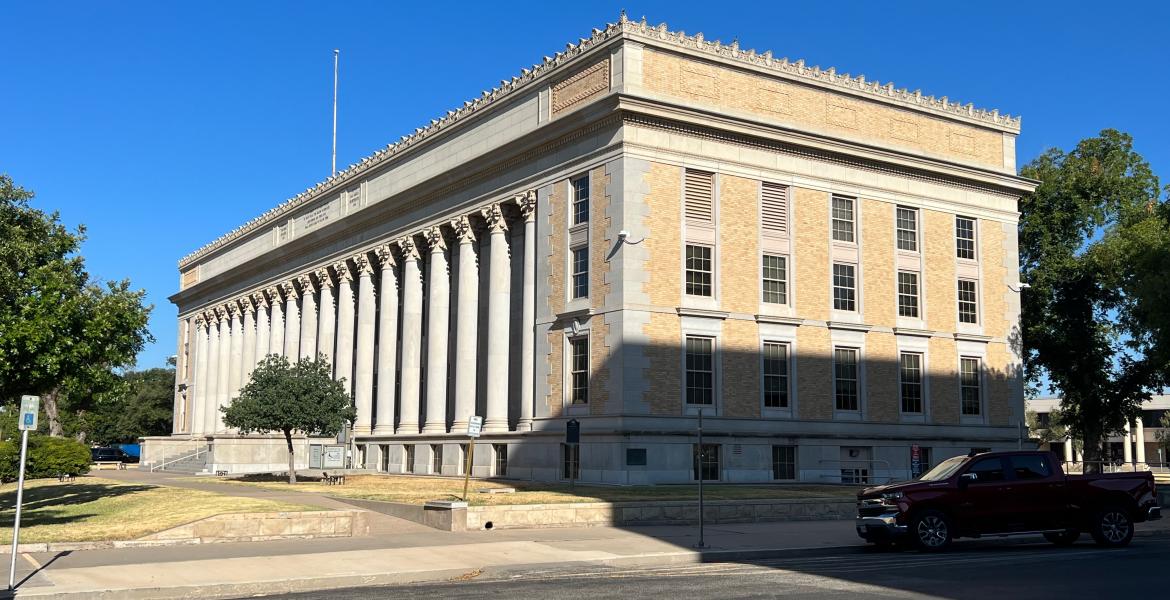On Friday, Jan. 2, in front of a fireplace in Judge Penny Roberts’ living room, history was made in quiet ceremony when Roberts swore in Dianna Spieker as the longest-serving county treasurer since 1872.
Spieker grew up in San Angelo, the daughter of an Air Force official and a mother who started working in the county treasurer’s office when she was a teen.
“I was probably 15 or 16 and Billie McDaniel was the treasurer,” Spieker recalled. “I had met Ms. McDaniel through my mother because she was momma’s boss, and there was an opening. It was my first job out of college and was making like $500 every [two weeks]. It was a lot…just after college.”
Spieker was 21 years old in 1988 when she applied for the job and got hired, her first real, “grown up” job after college. Over the years she progressed from data entry specialist to assistant data processing manager, ultimately becoming the chief deputy treasurer in the mid-90s.
“I got my business associate’s [at American Commercial College],” Spieker said. “I was always good at [numbers]. Math was my thing.”
Spieker said that growing she never anticipated she’d go into the political world, believing when she was younger that she actually wanted to be a nurse. When Billie McDaniel announced her retirement in ’94 she suggested Spieker run, and she went up against Donna Long.
“I remember her platform was she wanted to reduce the office staff, so guess who was going?” she laughed. “There were only two people in the office so I’m thinking, ‘hmm, I wonder who’s going.’”
Ultimately, Spieker met with Long and told her she’d like to stay through January 1995 to assist the office in completing all of the W-2s, then have a month to look for a job and adjust, after which she would voluntarily leave at the end of February.
Long agreed to the arrangement, but by mid-January decided that she’d like to keep Spieker on staff and offered her the job if she was interested in keeping it.
After Long’s four-year term came to an end in ’98, Spieker decided to run for treasurer again when Long announced she wouldn’t be seeking office. After winning support in the ’98 election, Spieker took office in January 1999, a position she’s held ever since.
“It’s very humbling,” she said. “When I actually first took the chair as treasurer, in my mind I had already worked in the office. I knew what it was all about; it’s all good. But there’s a big difference. Whereas before if there’s a big decision to be made…we have to do this because of my boss. Now all of a sudden you realize you’re the one [making the decisions]. That was probably the reality check. When you walk into the room and your staff quits talking because ‘the boss’ walked in, you realize, ‘hey, that’s me.’”
In 2014, Spieker was elected to her fifth term, officially making her the longest-serving treasurer in the history of the county. Having started in 1988, Spieker has worked in the office for 26 years, 16 of which she has served as county treasurer.
Her fifth term began on Jan. 1, 2015, ushering in another four years in the treasurer’s seat. Since she started over two and a half decades ago, Spieker says a lot has changed in the treasurer’s office, include technological advancements and new legal requirements that have evolved as briskly as the office equipment.
Office Evolution
“When I started, I started as a data entry clerk,” Spieker explained. “We were one of the few offices that had computers. It was on a system 36. We had computers just for the processing of AP checks and payroll checks. That’s basically all it did. We could generate a computer receipt, but it was on one of those old dot-matrix printers. We had these huge ledger books and that’s how we kept of all the county finances. That was it. It was all calculator tape, pencil and those green ledgers that we had to carry around.”
Escrow checks were done on typewriters, she recalled, remembering how she had to slap the head back into place after each line.
“We thought we were high time when we got a new swing line that would automatically go back,” she laughed. “That was probably in ’91-’92. We’d really moved up in the world because we had an automatic electric typewriter.”
Around that time, Spieker advanced to assistant data processing manager, and began backing up computer information on reel-to-reel systems as the county moved into an electronic era.
“They were these huge tape decks,” she described the AS400 reel-to-reel system. “Then it was a debate: are PCs really the wave of the future? There were only like a few people that had them because it was so foreign.”
Now, everything is done on computer, including check signatures, Spieker said. The only exception is jury checks, which Spieker still signs by hand.
“The only reason that I still sign jury checks is because it’s my way of saying ‘thank you,’” she explained. “Sometimes there’s 6-700 checks. A lot of them are not very much money and people come down to do their jury service and it’s real hard for people [to make those arrangements].”
Although the technology has changed radically since she started in the treasurer’s office in 1988, the added efficiency of digitalization has brought with it a broader range of tasks.
More and more information is being collected, monitored and stored for the state, meaning that while Spieker’s office can now print 30 checks a minute as opposed to one, they also have a lot more data to manage.
“We used to just keep track of how much we paid court-appointed [attorneys],” Spieker provided example. “Now we have to keep track of how much is court-appointed per court. So there’s extra line-items and extra details, whereas before when you were doing it by hand you were limited.”
Data
One of the largest expenditures for the county is the payroll of its roughly 800 employees. Maintaining the payroll is a large part of the job managed by Spieker and her staff, but they also keep up with court payments, purchases for county departments and offices, indigent health care, unemployment and worker’s comp reports.
“There’s actually a statute that I have to post on the website what our usage is in water, electricity and gas,” she laughed. The utilities have to be broken down by building and publically published on the website, just another bit of information the treasurer’s office is required to manage.
The office and methods are continually evolving, Spieker explained, as new requirements are added and technology changes. For example, the county is currently transitioning to direct deposit for accounts payable, which will eliminate the cost of envelopes and postage, the manpower to stuff the envelopes and print out the checks and the wait time for payment arrival.
“It will be a cost savings for the county,” she said, “and that’s what we’re trying to do is cost savings.”
Pay Raise
Anything involving money in the county falls under the treasurer’s purview, Spieker explained, and her objective is to save the county money. An example includes when Spieker agreed to serve as support staff for indigent health care, eliminating a director job and redistributing his salary.
Recently, however, Spieker came under fire when she and the district clerk’s office went to grievance before commissioner’s court and secured raises for themselves.
“The answer to that is, yes, I realize I did [petition for a raise], but as I can go to bat for my staff, the only person that can go to bat for me is me,” she said.
Spieker explained that she had compared treasurer’s office salaries from Texas counties with a comparable population and found that Tom Green had the lowest salaries. The only way to increase those if commissioner’s court is not raising them according to what officials feel is adequate, Spieker said, is to file a grievance.
“Basically the gist of it was that commissioner’s court should look at all official’s salaries just like they do employees and make sure they’re paying them accordingly,” Spieker said. “But nobody filed a grievance, so the only two people that they had any control over to set the salary was the district clerk and I.”
Accolades
Over the past decade and a half Spieker has sat in the treasurer’s seat, she’s accomplished a great deal of recognition, including serving as the president of the state’s County Treasurer’s Association from 2004-2005, as well as taking several seats on other boards and task forces across the state.
She has received multiple Best Practice awards for her work in Tom Green County, and in 2005 House of Representatives Bill 1566 was passed to honor Spieker for her public service.
As she begins her fifth term as county treasurer, Spieker said she doesn’t know how many more elections stand before her, but she will know when to stop.
“I always promised myself that if I ever felt like I could no longer benefit Tom Green County that I would not run again…I promise I will not turn into one of those officials that just shows up to work and draws a check,” she said.
Subscribe to the LIVE! Daily
Required






Post a comment to this article here: